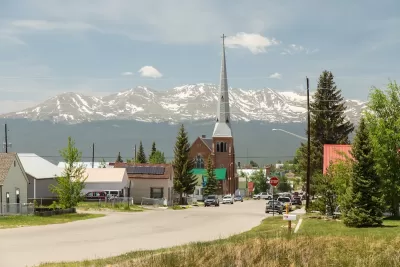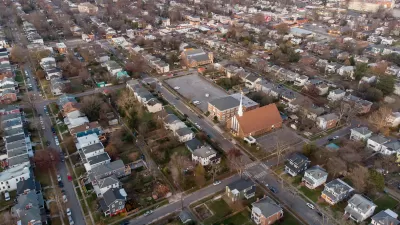Churches and religious institutions around the country are calling for zoning reforms that would allow them to build housing on their underused properties.

Colorado legislators will vote on a bill that would make it easier for religious institutions to build housing on land they own in a growing ‘Yes in God’s Backyard’ movement, reports Brian Eason in The Colorado Sun.
The measure would apply to church land even if it’s not already zoned for residential uses. “House Bill 1169, sponsored by Democratic Rep. Andrew Boesenecker of Fort Collins, would go beyond just churches, allowing public schools and universities to build housing on their land as well. It allows for up to three stories, but churches could build even higher densities if neighboring buildings are already taller.”
The YIGBY movement first took hold in San Diego, which changed its laws to allow housing on church land in 2019, a move followed by the state of California, where a UC Berkeley study estimates 47,000 acres of vacant church land could be used for housing. In Colorado, advocates say there are at least 5,000 available acres in Denver, Jefferson, Arapahoe and Douglas counties alone.
While supporters praise the bill for its potential to create thousands of new housing units, some local governments resent the state’s push to regulate what has long been a local issue. “And, while the bill would allow churches to build housing on their land, it doesn’t require it to be affordable. That could create an incentive for for-profit developers to target land owned by churches to bypass zoning requirements, then build market rate units.”
FULL STORY: In Colorado’s war against NIMBYism, Democrats want to give churches the right to build housing

Planetizen Federal Action Tracker
A weekly monitor of how Trump’s orders and actions are impacting planners and planning in America.

Maui's Vacation Rental Debate Turns Ugly
Verbal attacks, misinformation campaigns and fistfights plague a high-stakes debate to convert thousands of vacation rentals into long-term housing.

Restaurant Patios Were a Pandemic Win — Why Were They so Hard to Keep?
Social distancing requirements and changes in travel patterns prompted cities to pilot new uses for street and sidewalk space. Then it got complicated.

In California Battle of Housing vs. Environment, Housing Just Won
A new state law significantly limits the power of CEQA, an environmental review law that served as a powerful tool for blocking new development.

Boulder Eliminates Parking Minimums Citywide
Officials estimate the cost of building a single underground parking space at up to $100,000.

Orange County, Florida Adopts Largest US “Sprawl Repair” Code
The ‘Orange Code’ seeks to rectify decades of sprawl-inducing, car-oriented development.
Urban Design for Planners 1: Software Tools
This six-course series explores essential urban design concepts using open source software and equips planners with the tools they need to participate fully in the urban design process.
Planning for Universal Design
Learn the tools for implementing Universal Design in planning regulations.
Heyer Gruel & Associates PA
JM Goldson LLC
Custer County Colorado
City of Camden Redevelopment Agency
City of Astoria
Transportation Research & Education Center (TREC) at Portland State University
Jefferson Parish Government
Camden Redevelopment Agency
City of Claremont





























